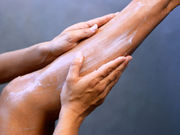Study results suggest scientists can use mice to find better ways to prevent melanoma in humans
MONDAY, April 18, 2016 (HealthDay News) — Applying 30 SPF sunscreen to mice before they were exposed to ultraviolet-B (UVB) radiation delayed the development of melanoma, according to research presented at the annual meeting of the American Association for Cancer Research (AACR), held from April 16 to 20 in New Orleans.
The study results suggest that mice can be used to identify and develop new and more effective ways to prevent melanoma, the investigators said.
“Sunscreens are known to prevent skin from burning when exposed to UV sunlight, which is a major risk factor for melanoma,” lead investigator Christin Burd, Ph.D., an assistant professor in the department of molecular genetics and the department of molecular virology, immunology, and medical genetics at Ohio State University’s cancer center, said in an AACR news release. “However, it has not been possible to test whether sunscreens prevent melanoma, because these are generally manufactured as cosmetics and tested in human volunteers or synthetic skin models.”
“We have developed a mouse model that allows us to test the ability of a sunscreen to not only prevent burns but also to prevent melanoma,” Burd added. “This is a remarkable accomplishment. We hope that this model will lead to breakthroughs in melanoma prevention.”
Copyright © 2016 HealthDay. All rights reserved.








